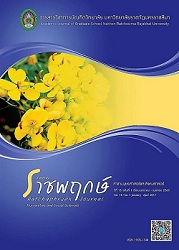การจัดการเรียนการสอนดนตรีในสถานศึกษา สังกัดสำนักงานคณะกรรมการการอาชีวศึกษา
Main Article Content
Abstract
การวิจัยครั้งนี้มีวัตถุประสงค์เพื่อศึกษาการจัดการเรียนการสอนดนตรีในสถานศึกษาสังกัดสำนักงานคณะกรรมการ การอาชีวศึกษา เป็นการวิจัยโดยใช้เทคนิคการวิจัยอนาคต (EDFR) ผู้ให้ข้อมูลเลือกแบบเจาะจงจากผู้เชี่ยวชาญในสถาบัน สอนดนตรี จำนวน 25 คน เครื่องมือที่ใช้ ได้แก่ แบบสัมภาษณ์แบบกึ่งมีโครงสร้าง และแบบสอบถามยืนยันความคิดเห็น เก็บรวบรวมข้อมูล จำนวน 3 รอบ รอบที่ 1 ผู้วิจัยสัมภาษณ์ผู้เชี่ยวชาญ จำนวน 25 คน รอบที่ 2 ผู้วิจัยสอบถามยืนยัน ความคิดเห็นของผู้เชี่ยวชาญโดยใช้แบบสอบถามแบบมาตราส่วนประมาณค่า 5 ระดับ และรอบที่ 3 ผู้วิจัยสอบถามยืนยัน ความคิดเห็นของผู้เชี่ยวชาญโดยใช้แบบสอบถามแบบมาตราส่วนประมาณค่า 5 ระดับ พร้อมทั้งป้อนกลับข้อมูลเชิงสถิติ (Statistical Feedbacks) วิเคราะห์ข้อมูลโดยใช้ค่ามัธยฐานและค่าพิสัยควอไทล์
ผลการวิจัยพบว่า มีประเด็นที่ผู้เชี่ยวชาญมีความเห็นสอดคล้องกันมากที่สุด (Mdn=5, IR=1) ได้แก่ 1) หลักสูตรการ เรียนการสอน 2) จำนวนกลุ่มวิชา 3) รายวิชาในแต่ละหลักสูตร 4) จำนวนผู้เรียนต่อห้องเรียน 5) สัดส่วนการเรียนปฏิบัติต่อ ทฤษฎี 6) คุณสมบัติของครูผู้สอน 7) หลักสูตรเป็นหลักสูตรฐานสมรรถนะ 8) อาคารสถานที่ 9) ลักษณะของห้องเรียนดนตรี และ 10) ผลกระทบที่เกิดขึ้นหลังจากการจัดการเรียนการสอนดนตรี
Music Instructional Management in Colleges under Office of the Vocational Education Commission
The purpose of this research was to study of Music Instructional Management in colleges under Office of the Vocational Education Commission (OVEC). The Ethnographic Delphi Future Research (EDFR) technique was used. The informants were 25 experts selected by purposive sampling from music institutes. The instruments include semi-structured interviews and questionnaires that were used to collect data for three rounds. Round one, 25 experts were interviewed. Then, research confirmed expert opinion in the round two by the rating scale questionnaire five level, and around three were asked to confirm expert opinion on by the rating-scale questionnaire and statistical feedbacks. The data were analyzed by using median and inter quartile range.
The research results revealed that the items were mostly consistent (Mdn =5, IR=1) among the experts, as follows; 1) Curriculum of study, 2) Number of Courses, 3) Subjects that should be included in each Curriculum, 4) Number of students per classroom, 5) Proportion between practical and theoretical hours, 6) Qualifications of teachers, 7) All course must be competency-based curriculum, 8) Premises, 9) Qualifications of musical classrooms, and 10) Impacts after music instructional management.

